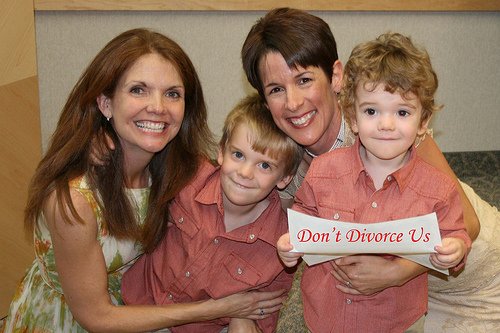The Mormon Church and Proposition 8

The hypocrisy and dishonesty of the Mormon Church (Church of Jesus Christ of Latter Day Saints) in supporting the gay marriage ban (Proposition 8) in California in November 2008 may have culminated in illegal use of its tax-exempt status to influence legislation.
FLDS Polygamy
- Bound by Fear: Polygamy in Arizona
For decades the state has let a feudal colony of fundamentalist Mormons force underage girls into illegal polygamous marriages
The Mormon Church, Polygamy, and Interracial Marriages
Mormons know better than most that marriage is NOT traditionally defined as "one man and one woman," as they claim over and over again in arguments and political advertisements. Polygamy, a definition of marriage that means "one man and many women," was standard practice among Mormons until 1890, when the church officially disallowed the practice and began to excommunicate members who clung to the practice after the US government criminalized polygamy, disincorporated the Mormon Church, and began to seize church property.
This disavowal led to schisms within the church, including the breakaway of the group calling themselves the Fundamentalist Church of Jesus Christ of Latter Day Saints (FLDS), who continue to practice polygamy and have been in the news lately due to the recent discovery of widespread child abuse and forced marriages between barely pubescent girls and middle-aged men.
The Mormon Church has also been a proponent of the definition of marriage as "one man and one woman of the same race." Though it never officially outlawed interracial marriage, the Mormon Church has a long history of discouraging them, dating back at least to Brigham Young, who stated "If the White man who belongs to the chosen seed mixes his blood with the seed of Cain (those with dark skin), the penalty, under the law of God, is death on the spot. This will always be so." Though interracial marriages have gained greater acceptance since a 1978 revelation that also granted blacks, for the first time, the right to become priests or have a temple marriage, they are still commonly discouraged within the Mormon community.
Who Else Donated?
- Dishonor Roll
Individuals and businesses have given a vast amount of money to take away are our recently attained freedom to marry in California, and we want you to know who they are.
More Perspectives on Prop 8
- A Conservative Christian Case for Civil Same-Sex Marriage
Since conservative Christians oppose gay marriage in the church for religious reasons, it is in our best interest to support gay marriage in society for civil rights reasons. - Black Folks and the Passage of Prop 8
While African Americans tend to be liberal on a variety of social spending and political measures, they are notoriously conservative on religious social issues. So the bigot brigade hopes to mobilize black voters to defeat equality and fairness. - The Economics of Gay Weddings
The social issues surrounding gay marriage aside, what are its implications for local, state and national economies? - Civil Unions vs. Gay Marriage
Why separate is not equal - FiveThirtyEight.com: Prop 8 Myths
At the end of the day, Prop 8's passage was more a generational matter than a racial one.
Mormons and Proposition 8
Mormons managed a remarkable feat of propaganda in the weeks leading up to November 4, 2008.
Early in the campaign, support for California's Proposition 8 trailed by 17 points in polls. Mormons poured money into the state, raising at least $10 million (possibly closer to $20 million) dollars in support of the so-called "Protect Marriage" campaign. With just 2% of the population of California, Mormons donated 40-80% of the funds in support of Proposition 8, many from out-of-state.
In two separate letters sent out by church leaders in May, they urged LDS members to donate to the campaign. One of the letters, which gave names and addresses for checks to be sent, urged church leaders to contact wealthy Mormons first, and specified that "no undue pressure of any type should be applied" to gain donations, but church leaders should explain to members that "this is a moral issue." Despite leaders' request not to use "undue pressure," some Mormons were told that their immortal souls would be in danger if they did not donate.
The money was used to fund an extraordinarily dishonest campaign that included attempts to blackmail businesses that donated money in opposition to Proposition 8.
When the depth of LDS involvement in the campaign became better known, the Mormons cut and run in the face of media scrutiny, shutting down Utah call centers they were using to call Californians about the measure. However, their lies and propaganda succeeded in passing the measure by a narrow margin.
San Francisco Supervisor Mark Leno has called on the IRS to investigate whether the church violated its tax-exempt status through its activities, stating:
"All Americans get to take part in the political process. Churches and other... charitable organizations get to speak their minds and advocate a position. But to take an active role in raising money, that means that these individuals are collecting salaries from an organization which exists off of tax-deductible contributions, and on church time and letterhead (they) are raising money to weigh in on a political ballot measure. ... I think that crosses the line."
IRS law states:
Section 501(c)(3) describes corporations, and any community chest, fund, or foundation, organized and operated exclusively for religious, charitable, scientific, testing for public safety, literacy, or educational purposes, or to foster national or international amateur sports competition (but only if no part of its activities involve the provision of athletic facilities or equipment), or for the prevention of cruelty to children or animals, no part of the net earnings of which inures to the benefit of any private shareholder or individual, no substantial part of the activities of which is carrying on propaganda, or otherwise attempting, to influence legislation (except as otherwise provided in section (h)), and which does not participate in, or intervene in (including the publishing or distribution of statements), any political campaign on behalf of (or in opposition to) any candidate for public office.
The Mormon Church has faced religious persecution for much of its existence. Many of its members know what it feels like to be hated and discriminated against. Yet it still chose to spread hate, intolerance, and discrimination, to literally write them into the California Constitution, even to the extent of using intimidation, threats, and outright lies in a campaign that very likely violated US tax law, as well as US values of freedom, tolerance, and civil rights.
What's Your Opinion on Proposition 8?
Do you agree with me? Disagree?
Please consider signing up here at HubPages and sharing your thoughts about Prop. 8 with the world.
Keith Olbermann on Proposition 8, Hitting the Nail on the Head
Fight Mormon Bigotry
- Yes! on Equality
Yes! on Equality - California's official 2010 marriage equality ballot. - Mormons Stole Our Rights
Sign a petition calling on the IRS to re-examine the Mormon Church's tax-exempt status - Revoke LDS Church 501(c)(3) Status
I created this blog because I believe that the members of the Church are some of the most loving people I have ever known in my life, and that they are not well served by the recent decision of Church leaders to support Prop. 8. - Mormons for Marriage
Mormons for Marriage supports marriage equality for all, and stands in respectful opposition to California Proposition 8. - Courage Campaign | Repeal Prop 8
This is our moment to stand strong together -- gay and straight -- and say that we refuse to accept a California where discrimination is enshrined in our state constitution. - Californians Against Hate
Californians Against Hate was established to draw attention to the major donors who are spending tens of millions of dollars to amend the California Constitution to take away the right of same-sex couples to marry. - Equality California
EQCA works to achieve equality and secure legal protections for LGBT people.
UPDATE - December 20, 2008
Proposition 8 supporters are now seeking to nullify about 18,000 gay marriages performed legally prior to Proposition 8's passing.


UPDATE - January 7, 2008
Much has been made of the supposed strong support (over 70% according to one poll) among the African American and Hispanic communities for Proposition 8. Unfortunately for these arguments, new studies of voting data have recently shown that party affiliation, political ideology, religious affiliation, and age were the primary factors driving the pro-Proposition 8 vote. When these were factored out, support for Proposition 8 among minorities was no higher than among whites. In fact support for Proposition 8 was higher among white, Asian, and Hispanic churchgoers than among African American churchgoers.
For more, check out Driving Factors of Prop 8 Vote.








